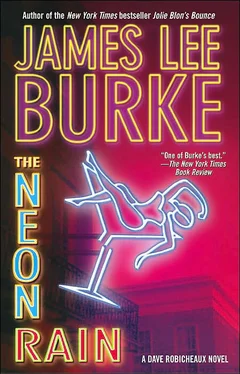"You remember a drink called Dr. Nut when we were kids?" he said.
"Sure."
"Boy, those were good, weren't they? The closest thing to it is a Dr Pepper. I guess that's why Southerners drink Dr Pepper all the time." He paused in the silence and brushed the tops of his fingers with his palms. "Look, I know you think the bottom's dropped out of everything, but try to look at what you got. You've put the cork in the jug, you've still got good friends, and you have a hell of a fine record as a police officer behind you."
"I appreciate it, Captain."
The phone rang, and he answered it with obvious relief. He listened for almost a full minute, his eyes blinking occasionally, then he said, "That's what he said-on Azalea Drive, the last pink stucco duplex. Next to a vacant lot." He looked at me. "That's right, isn't it, Dave? It's the last place on the street, and the apartment next door has newspapers on the lawn?"
I nodded.
"You got the right house," he said into the phone. "Did you find the landlord?… I see… No, sir, I don't understand it, either. I'd appreciate it, though, if you'd keep us informed, and we'll do the same… Yes, sir, thank you for your time and courtesy."
He hung up the phone and touched the hair implants in his scalp.
"The place is empty," he said.
"What?"
"There's no Philip Murphy, no body in the shower, no clothes in the closets, nothing in the cabinets or drawers. The next-door neighbor says a couple of guys were there this morning with a U-Haul trailer. The only thing that checks out is that the glass is gone from the shower doors, and it looks like somebody sawed a piece out of the bathroom doorjamb. Did it have some lead in it?"
"Yeah, I caught the edge of it with the first round."
"I don't know what to tell you, Dave."
"What about the landlord?"
"He lives in Mobile. They haven't talked with him yet."
"What about blood?"
"The place is clean. You're off the hook, at least for now."
"This means there's more of them out there. They're like army ants that trundle off their dead."
"I have thirty-two years in the department. Only once before have I run into something like this, and to tell you the truth it unnerved me for a long time. About twenty-two or twenty-three years ago, a car with three soldiers in it got hit by a train on Tchoupitoulas. They were all killed, and I mean really ground up under the engine. What bothered me was that all three of them were wearing seat belts. What are the odds of three fatalities all wearing their seat belts? Also, guys that are that careful don't put themselves in front of trains. Anyway, it was winter and they were supposed to be on leave from Fort Dix, New Jersey, but they had suntans like they'd been lying on the beach for six months. I think they were dead before that train ever hit them. Somebody belted them in their car and put them on the track at three in the morning.
"But I'll never know for sure, because the army claimed their bodies, bagged them up, and that's the last I heard of it. We'd better talk to the Treasury people tomorrow morning."
"They have a way of becoming comatose when they hear my voice on the phone."
"I'll call them. You did the right thing, coming here tonight. Things look a little better than they did a while ago, don't they?"
"Yes, sir, they do."
"There's something else I want to tell you. It looks like the prosecutor's office is going to drop the concealed-weapon charge against you."
"Why?"
"Elections are coming around again. It's law-and-order time. They're going to make a lot of newsprint about gambling and narcotics, and they don't want people accusing them of wasting taxpayers' money while they try a cop on a chickenshit weapons charge."
"Are you sure?"
"That's what I heard. Don't take it to the bank yet. But those guys over there are on their way up to higher things, and they don't care about our little problems in the department. Anyway, coast awhile, will you, Dave?"
But scared money never wins. You don't ease up on the batter in the ninth, you don't give up the rail on the far turn.
The next day it rained just before dawn, and when the sun came up, the trees along Carondelet were green and dripping, and the air was so thick with moisture it was almost foglike, suffused with a pink light the color of cotton candy. I parked down the street from Clete's house in a working-class neighborhood that would eventually be all black. His lawn had been recently mowed, but it had been cut in uneven strips, with ragged tufts of grass sticking up between the mower's tracks, and the cracks in the sidewalk and driveway were thick with weeds. His garbage cans had been emptied yesterday, but they still lay out front, their battered sides glistening with dew. At seven-thirty he came out the front door, dressed in a white short-sleeved shirt, a striped tie, and seersucker pants, his coat over his arm. His belt was hitched under his navel, the way a retired football player might wear it, and his big shoulders made him look as if he had put on a boy's shirt by mistake.
I followed him across town in the traffic. Up ahead at a red light, as the heat and humidity of the day began to gather and intensify among the tall buildings and jammed automobiles, I saw him yawn widely, rub his face as though he were trying to put life back in dead tissue, and rest his head against the door. There was a man with a real dose of the yellow-dog blues, I thought. By midmorning he would be sweating heavily, emptying the water cooler, debating whether he should eat more aspirin, hiding with his misery in the darkness of a toilet stall; at noon he would emerge into the sun's glare and the roar of traffic, and drive across Canal to a café where nobody knew him so he could drink beer with his meal until one o'clock and glue his day back together. He was serving hard time, but it was about to get worse.
He double-parked in front of the Greyhound bus depot and went inside, putting on his coat. Five minutes later he was back in his car, working his way into the traffic, looking around as though the whole world were coming at him in the rearview mirror.
I went back to my houseboat, called the hospital about Jimmie, pumped iron, ran four miles along the lakefront, cleaned and oiled my twelve-gauge, and cooked some red-fish and dirty rice for lunch while I listened to an old recording of Blind Lemon Jefferson:
Dig my grave with a silver spade
And see that my grave is kept clean.
Oh dear Lord, lower me down on a golden chain.
I wondered why it was that only black people seemed to treat death realistically in their art. White people wrote about it as an abstraction, used it as a poetic device, concerned themselves with it only when it was remote. Most of Shakespeare's and Frost's poems about death were written when both men were young. When Billie Holiday, Blind Lemon Jefferson, or Leadbelly sang about it, you heard the cock of the prison guard's rifle, saw the black silhouette suspended from a tree against a dying red sun, smelled the hot pine box being lowered into the same Mississippi soil a sharecropper had labored against all his life.
That afternoon I went up to the hospital and spent two hours with Jimmie. He slept with the remoteness of someone who had moved off into another dimension. Occasionally his mouth twitched, as though a fly had settled on it, and I wondered what painful shard of memory was at work under the almost featureless, ashlike mask that had become his face. I hoped he was not remembering the gun flashes fired point-blank at his head through the door of the toilet stall. Few people appreciate the level of terror that a person experiences at that moment. Soldiers learn not to talk about it. Civilian victims try to explain it to friends and therapists, and are often treated with the sympathy we extend to babbling psychotics. But the best description I ever heard of it was not from a soldier or victim. We had a serial killer in an isolation cell at the First District, and he gave an interview to a woman reporter from the Times-Picayune . I'll never forget his words:
Читать дальше












